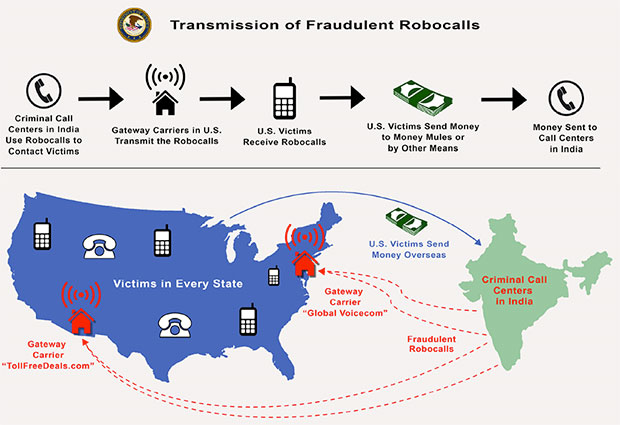Feds Seek Restraining Orders in Robocall Cases
The United States Department of Justice on Tuesday filed complaints in two landmark cases calling for temporary restraining orders against five companies and three individuals alleged to have carried hundreds of millions of fraudulent robocalls to American consumers.
The defendants in one case are Ecommerce National LLC dba TollFreeDeals.com; SIP Retail dba sipretail.com; and their owner/operators, Nicholas Palumbo, 38, and Natasha Palumbo, 33, of Scottsdale, Arizona.
The defendants in the other case are Global Voicecom Inc., Global Telecommunication Services Inc., KAT Telecom Inc., aka IP Dish, and their owner/operator, Jon Kahen, 45, of Great Neck, New York.
“This is the first time the DoJ is taking legal action against anyone for facilitating fraudulent robocalls,” said Liz Miller, principal analyst at Constellation Research.
“The U.S. Federal Trade Commission has a lengthy track record of bringing suits in this space and going after facilitators of fraudulent robocalls, so there is a blueprint on going after these actors,” she told the E-Commerce Times.
The five companies were warned repeatedly that they were carrying fraudulent robocalls, including calls purportedly from government and businesses, said DoJ, but they continued their activities and facilitated foreign-based fraud schemes targeting Americans regardless.
The calls, most of which originated in India, resulted in massive financial losses for vulnerable victims across the U.S., including many elderly people.
In each case, the Department of Justice sought an order immediately halting the defendants’ transmission of unlawful robocall traffic. A federal court has entered a temporary restraining order against the Global Voicecom defendants.

The DoJ alleges the defendants acted as gateway carriers into the U.S. telecommunications system for calls initiated overseas through their Voice over Internet Protocol carriers.
Ecommerce National carried 720 million calls during a sample 23-day period, the DoJ said. More than 425 million lasted less than 1 second, indicating they were robocalls. Many were fraudulent and used spoofed caller ID numbers.
The calls facilitated by the defendants falsely threatened victims with various catastrophic government actions, including termination of Social Security benefits, imminent arrest for alleged tax fraud, and deportation for supposedly failing to fill out immigration forms correctly.
A Clear and Present Nuisance
“Robocalls are an annoyance to many Americans, and those that are fraudulent and predatory are a serious problem, often causing devastating financial harm to the elderly and vulnerable members of our society,” said Assistant Attorney General Jody Hunt for the DoJ’s Civil Division.
Americans lost US$10.5 billion to scammers in 2018, according to Truecaller. The number of Americans falling victim to phone scams rose by 70 percent.
In December, 4.6 billion robocalls were placed nationwide in the U.S., YouMail found. That works out to 1,700 calls per second. Each person received an average of nearly 14 calls.
More than 40 percent were scams.
The U.S. ranked No. 10 in the top 20 countries affected by spam calls and SMS in 2019, Truecaller said.
“The Department of Justice will pursue to the fullest extent of the law individuals in the United States who knowingly facilitate imposter fraud calls, using both criminal and civil tools where appropriate,” said DoJ’s Hunt.
The U.S. needs “a greater effort to go after foreign firms and individuals that do this,” said Rob Enderle, principal analyst at the Enderle Group.
The government should “provide both incentives and penalties for the telephone companies to more aggressively police these activities,” he told the E-Commerce Times.
“Until it’s in the financial interests of carriers to block these calls consistently, as in either an opportunity or a financial penalty or sanction, nothing substantial will change,” said Nicole France, principal analyst at Constellation Research.
The DoJ lawsuits “are something, but not a whole lot more than window dressing,” she told the E-Commerce Times.
The DoJ plans to work closely with law enforcement agencies in India and elsewhere to identify people behind the robocallers and bring them to justice.
“You have to be able to curtail the behavior at the source, or they’ll find a way around any barriers you put up,” Enderle said. “This is a lot easier to do and far less risky than selling drugs, and the government hasn’t been able to stop the illegal drug trade.”
However, “a lot of other countries have their own issues, where they don’t prioritize this because it’s not causing harm to their citizens, as one example, or they don’t have the resources to focus on this problem rather than other, bigger issues that are affecting more people,” observed Alex Quilici, CEO of YouMail.
Effect of the DoJ’s Actions
“By going after the carriers, you shut down multiple different robocallers, and make it more difficult for them to make their robocalls since they have to find alternate carriers,” Quilici told the E-Commerce Times.
“It’s a smart strategy but it remains to be seen whether it works, or whether there are so many carriers and robocallers that it’s just a game of Whac-A-Mole.”
Setting up robocallers “is a massive game of cat and mouse, especially for the criminal enterprise,” Constellation’s Miller remarked. “These are fast moving, often sophisticated organizations executing these massive-scale scams.”
Technology makes setting up robocallers quick, easy and inexpensive.
“With automated attendants, you can blanket thousands of people for little money with the hope that one or two pay up,” Enderle said.
The ease of getting into the game is a problem, noted Miller, “but there’s nothing wrong with making this a hell of a lot harder.”
Conclusion: So above is the Feds Seek Restraining Orders in Robocall Cases article. Hopefully with this article you can help you in life, always follow and read our good articles on the website: Ngoinhanho101.com





